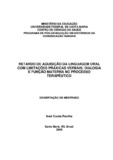| dc.creator | Rechia, Inaê Costa | |
| dc.date.accessioned | 2009-06-24 | |
| dc.date.available | 2009-06-24 | |
| dc.date.issued | 2009-01-09 | |
| dc.identifier.citation | RECHIA, Inaê Costa. DELAY OF ORAL LANGUAGE ACQUISITION OF DYSPRAXIA TYPE: DIALOGY AND MATERN FUNCTION ON SPEECH THERAPY. 2009. 123 f. Dissertação (Mestrado em Fonoaudiologia) - Universidade Federal de Santa Maria, Santa Maria, 2009. | por |
| dc.identifier.uri | http://repositorio.ufsm.br/handle/1/6450 | |
| dc.description.abstract | In this study we investigated the possible effects of the symptom of dyspraxic and matern function in mother-child interaction dialogic with delay in oral language.
The results of linguistic analysis of the interactions of mother-child dyad with the exercise of maternal function was confronted and the efficacy and effectiveness of
therapeutic strategies in line interactionist / psychotherapy was analyzed. On this study, six subjects took part, who went through footage of the mother-child dyad and therapist-child for realization of the analysis. There were also continuous interviews with the mothers with a view to including them in the therapeutic process, giving them voice. There was a poor link between mother-child, with exercise of maternal function deficit, intrusive mothers, absent, teaching or super-present, which took place in substantially reducing or virtual absence of dialogic interaction. This dialogical
insecurity prevented the linguistic support necessary for language development. The paternal figure was virtually absent in five of the six cases. Therapeutic interactions
between the speech therapist and child, added to ongoing interviews and meetings with moments of the dyad, led the rise in mother-child bond and improves the dialogic interaction. We find the emergence of the desire of the mother and son on the potentiation of linguistic operation in dyad capable of anchoring greater possibilities of language of children. | eng |
| dc.description.sponsorship | Coordenação de Aperfeiçoamento de Pessoal de Nível Superior | |
| dc.format | application/pdf | por |
| dc.language | por | por |
| dc.publisher | Universidade Federal de Santa Maria | por |
| dc.rights | Acesso Aberto | por |
| dc.subject | Linguagem infantil | por |
| dc.subject | Função materna | por |
| dc.subject | Dispraxia | por |
| dc.subject | Psicanálise | por |
| dc.subject | Child language | eng |
| dc.subject | Maternal function | eng |
| dc.subject | Apraxias | eng |
| dc.subject | Psychoanalysis | eng |
| dc.title | Retardo de aquisição da linguagem oral com limitações práxicas verbais: dialogia e função materna no processo terapêutico | por |
| dc.title.alternative | Delay of oral language acquisition of dyspraxia type: dialogy and matern function on speech therapy | eng |
| dc.type | Dissertação | por |
| dc.description.resumo | Neste trabalho, foram investigados os possíveis efeitos do sintoma dispráxico e da função materna na interação dialógica mãe-criança com retardo de linguagem oral. Confrontaram-se os resultados das análises lingüísticas das interações da
díade mãe-criança com o exercício da função materna e analisaram-se a eficácia e efetividade de estratégias terapêuticas na linha interacionista/psicanalítica. Fizeram
parte deste estudo seis sujeitos que passaram por filmagens da díade mãe-criança e terapeuta-criança para realização das análises. Realizaram-se ainda entrevistas continuadas com as mães com o intuito de incluí-las no processo terapêutico,
dando-lhes voz. Observou-se um vínculo precário entre mãe-filho, com exercício da função materna deficitário, mães intrusivas, ausentes, pedagógicas ou superpresentes cuja materialidade se deu na diminuição ou quase-ausência da
interação dialógica. Tal precariedade dialógica impedia o suporte lingüístico necessário para o desenvolvimento da linguagem. A figura paterna era praticamente ausente em cinco dos seis casos. Interações terapêuticas entre a Fonoaudióloga e a criança, somadas às entrevistas continuadas e momentos de sessões com a díade,
permitiram o aumento do vínculo mãe-filho e melhora da interação dialógica. Percebe-se o surgimento do desejo da mãe sobre esse filho e a potencialização do funcionamento lingüístico na díade capaz de ancorar maiores possibilidades de
linguagem das crianças. | por |
| dc.contributor.advisor1 | Souza, Ana Paula Ramos de | |
| dc.contributor.advisor1Lattes | http://lattes.cnpq.br/7859963389320763 | por |
| dc.contributor.referee1 | Surreaux, Luiza Milano | |
| dc.contributor.referee1Lattes | http://buscatextual.cnpq.br/buscatextual/visualizacv.do?id=K4768852E2 | por |
| dc.contributor.referee2 | Mezzomo, Carolina Lisbôa | |
| dc.contributor.referee2Lattes | http://buscatextual.cnpq.br/buscatextual/visualizacv.do?id=K4779654H0 | por |
| dc.creator.Lattes | http://lattes.cnpq.br/9355259342982998 | por |
| dc.publisher.country | BR | por |
| dc.publisher.department | Fonoaudiologia | por |
| dc.publisher.initials | UFSM | por |
| dc.publisher.program | Programa de Pós-Graduação em Distúrbios da Comunicação Humana | por |
| dc.subject.cnpq | CNPQ::CIENCIAS DA SAUDE::FONOAUDIOLOGIA | por |


